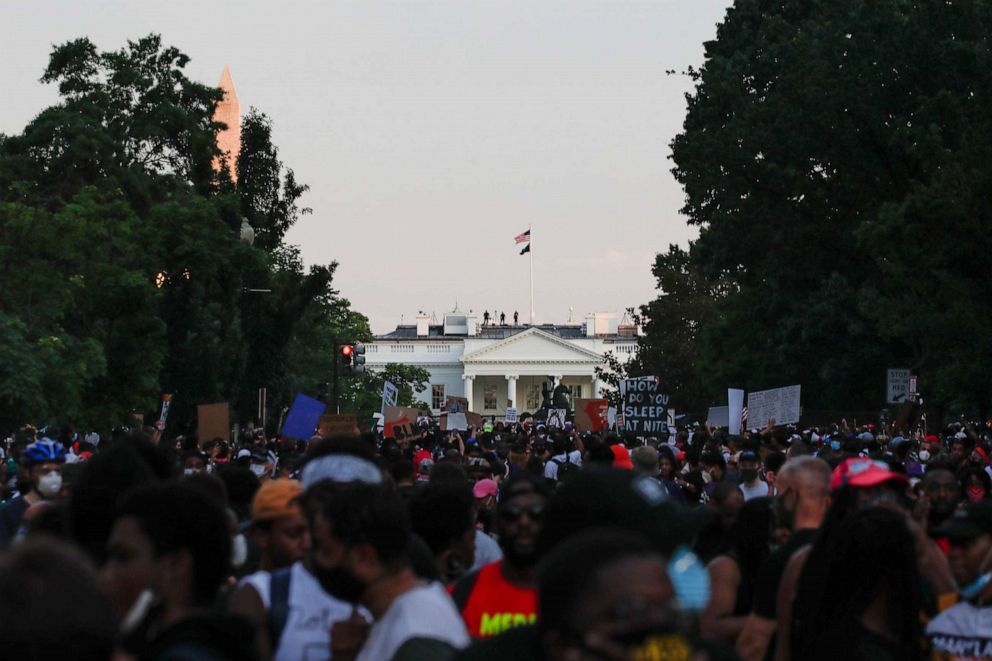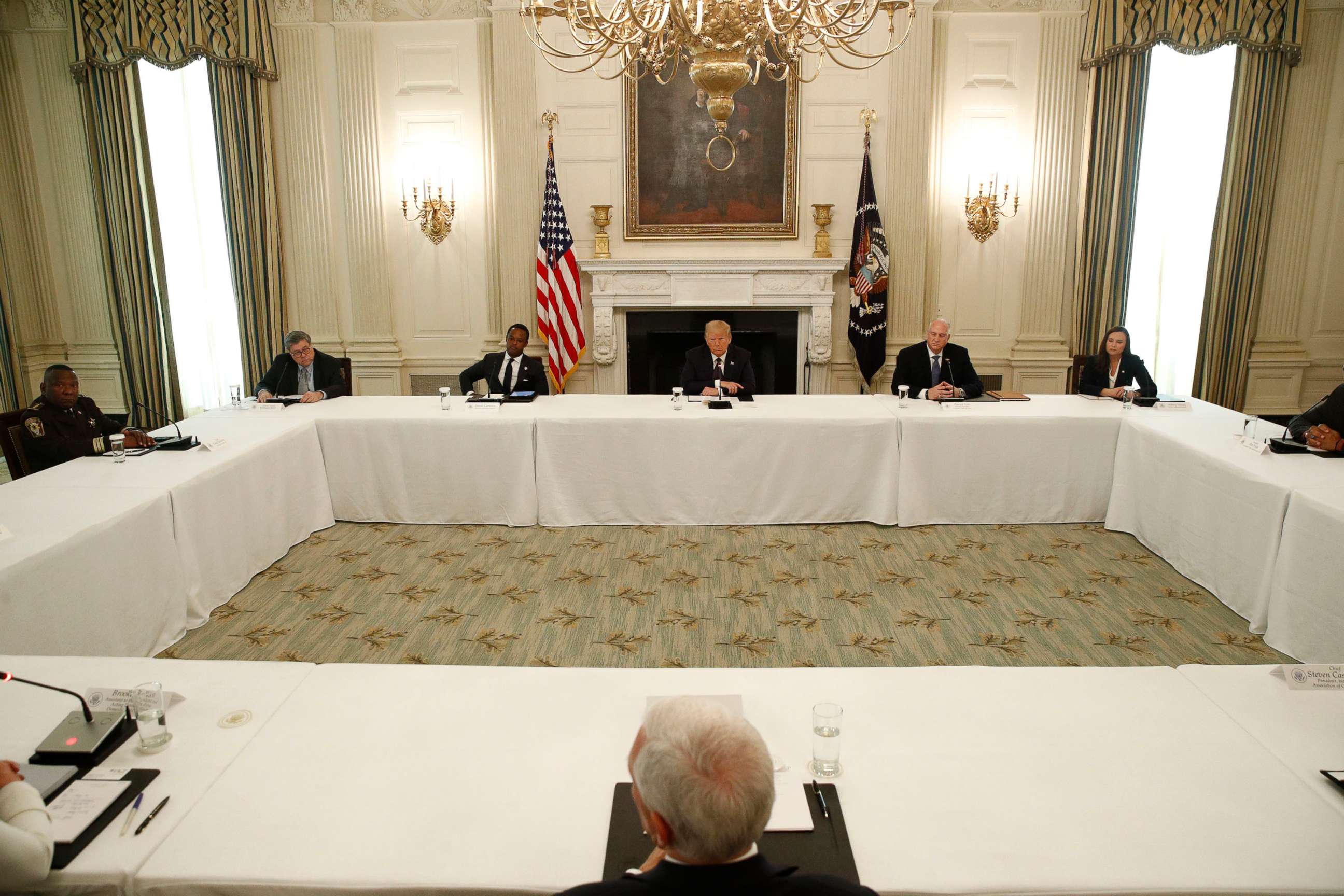As George Floyd laid to rest, Trump tweets baseless conspiracy theory about protester
Trump has said he’d consider some reform for policing in “more gentle fashion.”
On the day George Floyd was being laid to rest and the nation faced a reckoning on race relations, President Donald Trump remained silent on the pressing issue and instead tweeted a baseless conspiracy theory about a peaceful protester allegedly assaulted by police.
The attack on a 75-year-old man shoved to the ground by two officers in Buffalo, New York -- who now face felony charges -- came as the president has seen his poll numbers drop and a day after his presumptive Democratic opponent for the presidency, Joe Biden, visited Floyd's family and expressed solidarity with protesters demanding racial justice.
Biden also spoke via video message at Floyd's funeral.

Seeking to cast himself as the "law and order" president, Trump has seized on protesters' chants to “defund the police,” removing the nuance of their demands and attempting to connect presumptive Democratic nominee Joe Biden to the more extreme elements of the debate.
Biden has said he does not support defunding the police but told CBS News he does support “conditioning federal aid to police based on whether or not they meet certain basic standards of decency and honorableness.”
On Monday, Trump used a roundtable meeting with law enforcement representatives to declare his unwavering support for the nation’s police officers even as nationwide protests against brutality and racial bias in the nation’s policing system continued.
"I'm very proud of them. They won't be defunding, they won't be dismantling of our police, and there's not gonna be any disbanding of our police. Our police have been letting us live in peace,” the president said Monday.

His meeting with law enforcement came as he has yet to hold any sort of event to demonstrate that he is also listening to protesters or victims.
The president said he is open to considering some reforms to carry out policing in what he described as a “more gentle fashion,” in contrast to his telling a law enforcement audience in July 2017, "When you see these thugs being thrown into the back of a paddy wagon, you just seen them thrown in, rough. I said, ‘Please don’t be too nice,’" he said.
"When you guys put somebody in the car and you’re protecting their head you know, the way you put their hand over [their head]," Trump continued, mimicking the motion. "Like, 'Don’t hit their head and they’ve just killed somebody, don’t hit their head.' I said, 'You can take the hand away, OK?'
On Monday, he also made clear that he doesn’t believe there’s a systemic problem within the ranks of law enforcement.
“I say 99.9, but let's go with 99 percent of them are great, great people, and they've done jobs that are record-setting, record-setting,” said Trump, who acknowledged there are some “bad actors.”
The White House has not elaborated on what sorts of reforms the president may be willing to throw his support behind other than to say he is actively considering “various proposals.”
Trump himself has so far refrained from offering specific proposals, either on Twitter -- where he has been particularly active over the past week -- or in public. He has not answered questions from reporters in 10 days, an unusually long stretch.
The president fired off a variety of tweets on Tuesday -- but none about Floyd or his funeral. Vice President Mike Pence and first lady Melania Trump likewise made no comment about the funeral Tuesday.
"You're sitting now trying to figure out how you're going to stop the protest, rather than how you're going to stop the brutality," civil rights activist Rev. Al Sharpton said, in comments directed at Trump during the funeral service. "You're calling your Cabinet in, trying to figure out how it's going to affect your vote, rather than how it's going to affect our lives.
"You are scheming on how you can spin the story, rather than you can achieve justice," he continued. "Wickedness in high places."
Sharpton criticized Trump's photo op at a church near the White House last week, made possible after federal law enforcement officers forcibly cleared peaceful protesters from his way.
“The president talks about bringing in the military, but he has not said one word about eight minutes and 46 seconds of police murder of George Floyd,” Sharpton said, referring to the length of time a Minneapolis police officer pressed his knee against Floyd's neck. “Oh, he said, ‘The family has my sympathy’ and all of this. He didn't give those in other situations his sympathy. He challenged China on human rights, but what about the human right of George Floyd?”
He said Trump had neglected to turn to religion previously, such as after the fatal shootings of two other black Americans whose deaths have become symbols of racism in the United States, Ahmed Arbery in Georgia and Breonna Taylor in Kentucky.
"You take rubber bullets and tear gas to clear out peaceful protesters and then take a Bible and walk in front of a church and use a church as a prop," Sharpton said. "Wickedness in high places. You ain't been walking across that street when the church didn't have the boards up. You wasn't holding up no Bible when Arbery was killed in Brunswick, when Taylor was killed in Louisville. Wickedness in high places."
Congressional Democrats on Monday already unveiled their own plan on Monday in a new legislative proposal that would ban chokeholds, move to create new standards for using force, and curtail protections that shield officers accused of wrongdoing.
The bill lacked support from the other side of the aisle, though, with Sen. Mitt Romney, R-Utah, saying Democrats did not reach out to their Republican counterparts for their thoughts.
Romney said Monday he was working with other Republican senators to see if they could fashion a piece of legislation that would receive bipartisan support.
While a White House told ABC News there has been "informal contact" with Senate Republicans about their legislation related to race and policing, it appears unlikely that the president would team up with any initiative led by Romney, whom the president mocked after he took part in a Black Lives Matter protest in Washington over the weekend.
ABC News' Libby Cathey contributed reporting.




